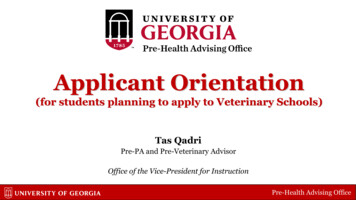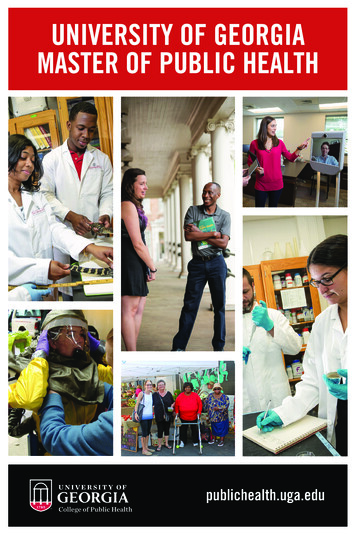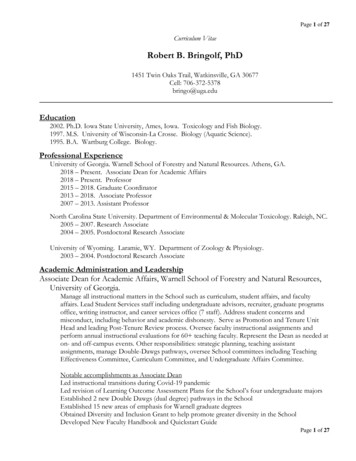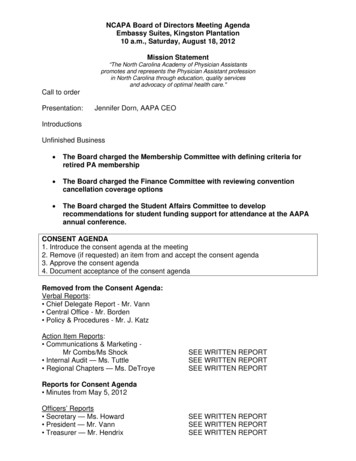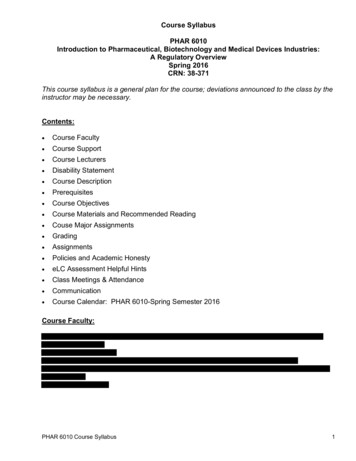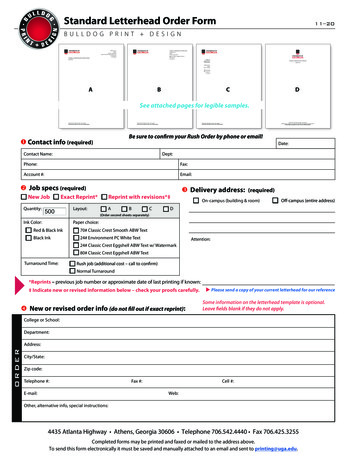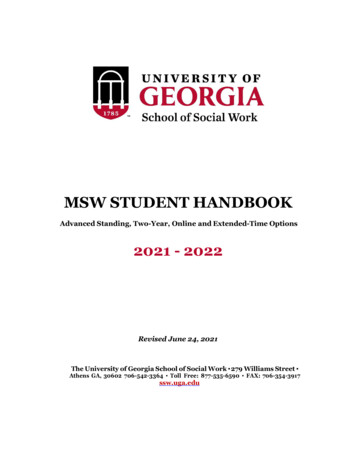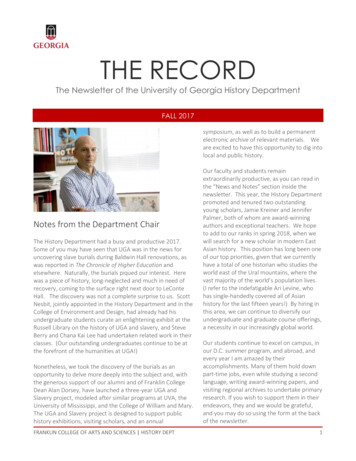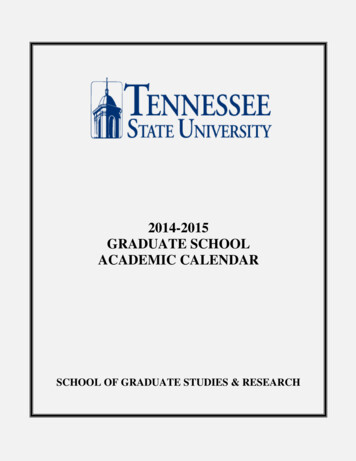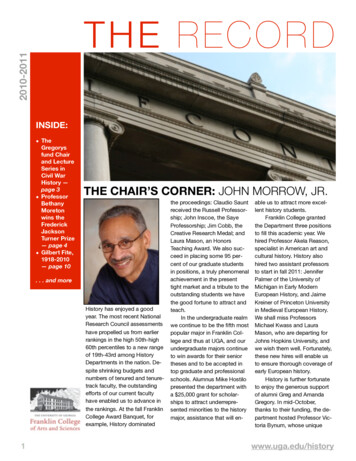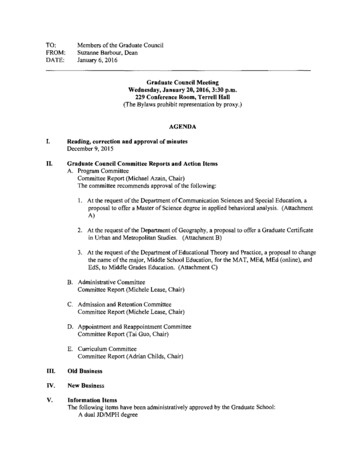
Transcription
TO:FROM:DATE:Members of the Graduate CouncilSuz.anne Barbour, DeanJanuary 6, 2016Graduate Council MeetingWednesday, January 20, 2016, 3:30 p.m.229 Conference Room, Terrell Hall(The Bylaws prohibit representation by proxy.)AGENDALReading, correction and approval of minutesDecember 9, 2015II.Graduate Council Committee Reports and Action ItemsA. Program CommitteeCommittee Report (Michael Azain, Chair)The committee recommends approval of the following:1. At the request of the Department of Communication Sciences and Special Education, aproposal to offer a Master of Science degree in applied behavioral analysis. (AttachmentA)2. At the request of the Department of Geography, a proposal to offer a Graduate Certificatein Urban and Metropolitan Studies. (Attachment B)3. At the request of the Department of Educational Theory and Practice, a proposal to changethe name of the major, Middle School Education, for the MAT, MEd, MEd (online), andEdS, to Middle Grades Education. (Attachment C)B. Administrative CommitteeCommittee Report (Michele Lease, Chair)C. Admission and Retention CommitteeCommittee Report (Michele Lease, Chair)D. Appointment and Reappointment CommitteeCommittee Report (Tai Guo, Chair)E. Curriculum CommitteeCommittee Report (Adrian Childs, Chair)III.Old BusinessIV.New BusinessV.Information ItemsThe following items have been administratively approved by the Graduate School:A dual JD/MPH degree
FORMAL PROPOSAL FOR A NEW DEGREE PROGRAM(Traditional/Face-to-Face Delivery)Institution: University of GeorgiaApproval by President or Vice President for Academic Affairs:Date: March 25, 2015School/Division: University of Georgia, College of EducationDepartment:Communication Sciences and Special EducationDepartmental Contact: Cindy VailName of Proposed Program/Inscription: Applied Behavior AnalysisDegree:Master of ScienceMajor:Applied Behavior AnalysisCIP Code:Anticipated Implementation Date: August 2016Approval by Chief Business Officer (or designee):Contact Information:Approval by Chief Facilities Officer or designee (if different from CBO):Contact Information:1. Description of the program’s fit with the institutional mission, existing degrees andmajors.
The Master of Science in Applied Behavioral Analysis (ABA) will fit the mission of theUniversity of Georgia as it provides students the knowledge and skills necessary to evaluateindividuals’ behavioral and skill needs, develop relevant interventions, and assess theeffectiveness of those interventions. A mission of the University of Georgia is to “preparethe University community and the state for full participation in the global society of thetwenty-first century.” Furthermore, UGA strives to help its students develop an“understanding of and respect for cultural differences necessary for an enlightened andeducated citizenry.” Fortunately, in the twenty-first century individuals with special needshave gained a level of respect and appreciation that they were not afforded in the past. To agreater extent than previous generations, our society respects their differences butunfortunately their needs are often misunderstood due to lack of personnel with the expertiseto work with these individuals and their caregivers. The ABA program will help UGA meetits mission by increasing the number of personnel with (a) the knowledge and skillsnecessary to improve the lives of individuals with special needs and (b) the background toconduct research related to assessing and teaching behavioral and academic skills toindividuals with disabilities.The ABA program will combine the talents of individuals within two departments in theUGA College of Education (Department of Communication Sciences and Special Education;Department of Educational Psychology), thus complementing the Graduate Schools’Strategic Plan 2020 (Goal 2: Enhance the culture of innovation and interdisciplinarity ingraduate education). Faculty in these two departments have worked together in developmentof a course sequence approved by the Behavioral Analysis Certification Board (BACB).Taking a course sequence approved by the BACB allows individuals who also gain theirsupervision hours to sit for the Board Certified Behavior Analyst (BCBA) examination.Being a credentialed BCBA allows service providers (clinical settings) to know that anindividual has the knowledge to conduct behavioral assessments, develop functionallyrelevant interventions, and monitor intervention effects. Students across these two COEDepartments have completed the course sequence and earned their BCBA while earningmaster's in special education or master's and doctoral degrees in special education andeducational psychology with a concentration in school psychology. A master's in ABAwould allow individuals who wish to focus their expertise in behavioral analysis to do sowithout having to complete courses that are necessary for a degree is special education,communication sciences, or educational psychology. Furthermore, it would allowindividuals who already have a master’s degree in special education or a related field to earna second degree that would enable them to develop expertise in ABA and work outside of aschool system.Although in absence of an ABA master’s level program, some graduate students elect toenroll in the UGA Special Education Program, that program does not perfectly match theirdegree objectives. The ABA program will enable us to provide a program that mirrors theneeds and interest of graduate students who do not wish to later become special educationteachers. Not only will the degree better match some students’ interest, but it will enablethese students to earn their degree in a shorter period of time as they will not have to bothconduct practicum coursework within schools for the special education major and takepracticum requirements necessary for the students to sit for the BCBA exam. Furthermore,the ABA program will attract students who might otherwise choose to pursue a degree out ofthe USG set of institutions. It is not expected that students who are currently enrolled in thespecial education program, and thus have at a minimum one year of course work towards
their special education degree, will change their major to ABA. Choosing to do so wouldresult in students loosing credits that they earned through student teaching. Furthermore, thespecial education students who might consider changing their degree objective would be thestudents of the faculty who also make up the ABA program. We would advise againststudents making such a change in their program of study.2. Program Description and Goals:a.Institutional Priority: Describe how the proposed program is alignedwith the institution’s academic strategic plan. Indicate where thisprogram falls in terms of the institution’s top priorities for new degrees.The proposed ABA program is aligned with multiple components of UGA’s strategicdirections/priorities. First, a strategic direction of UGA is to build graduate andprofessional programs. Currently, there are only 55 master's-level ABA programs acrossthe United States, with the large majority of the programs being online programs.Furthermore, unlike the majority of programs, the UGA program will offer to studentssupervised practicum experiences, enabling them to have all of the components necessaryto sit for their BCBA exam. Personal communications with three of the five master'slevel ABA programs identified through a search of the internet indicates that theseprograms receive in excess of 75 applicants to their program per year. Thus, it issuspected that there will be a high demand for the program. As a strategic priority inbuilding graduate and professional programs, UGA seeks to increase the number ofinterdisciplinary opportunities provided to students. The courses offered through theproposed master's ABA program are courses currently being offered by schoolpsychology and special education faculty across two departments within the College ofEducation. Thus, all courses enrolled in by students within the ABA program will beinterdisciplinary.A second strategic direction that the proposed ABA programs would address is that ofinvesting in research excellence at UGA. There are five core faculty members whowould offer courses through the ABA program (Drs. Ardoin, Ayres, Davis, Ringdahl,Wunderlich). Drs. Ringdahl and Wunderlich are new to the UGA faculty as of fall 2015.Three of these faculty members have been successful in obtaining external funding bothfor training and research purposes. Currently Ardoin and Ayres are Co-PIs of a master'slevel training grant and have an interdisciplinary doctoral-level training grant underreview by the U.S. Department of Education. The proposed master's and doctoral ABAprogram would provide further evidence for grant reviewers of the ability of the ABAfaculty to collaborate. Furthermore, a primary mission of the UGA COE’s Center forAutism and Behavioral Education Research (CABER) is to enhance the instructionalenvironment of children with and without disabilities by training graduate students inevidence based assessment and intervention skills. The proposed program of study forthe Master of Science in ABA is a perfectly aligned for such training.A third strategic direction addressed by the proposed ABA program is that the programwould be “Serving the Citizens of the State of Georgia and Beyond.” Recently the Stateof Georgia joined 33 other states in requiring that insurance companies assist families inproviding ABA/BCBA services to individuals with autism. Unfortunately, across thenation there is a shortage of individuals with the necessary credentials to provide theseservices to schools and families. Thus, the master's program would provide a service to
the state and nation by developing graduate students in an area of high need. Under thisstrategic direction is also a strategic priority that UGA provide “educational and outreachprograms that enhance the social, economic, and environmental well-being and health ofindividuals and communities.” As part of the ABA course sequence students wouldcomplete practicum experiences supervised by faculty which would involve the studentsconducting assessments, developing interventions, and monitoring the effects of thoseinterventions for individuals with disabilities. Drs. Ardoin and Ayres have workingrelationships with local school districts and service agencies in which these serviceswould be provided. Furthermore, Dr. Ayres directs the UGA Applied Behavior AnalysisSupport Clinic and Dr. Ardoin directs the UGA School Psychology Clinic, both clinicsprovide services to students in need of assessment and intervention services at areduced/no-cost rate. The ABA program would allow for increased provision ofassessment and intervention services through these clinics, thus allowing the clinics toimprove the well-being and mental health of a greater number of individuals andcommunities in Georgia.A second priority under the strategic direction to “Serve the Citizens of Georgia” is thatthe University “Link UGA research and innovation to real-world problems by supportingand encouraging faculty involvement in public service and outreach activities including,but not limited to, the sharing of research.” As previously stated, the faculty which willmake up this program have been successful in applying for both training and researchgrants. All of their grants, regardless of type, have involved the conducting of research inapplied settings that have direct and beneficial outcomes for the research participants(reduction of problem behavior, improved academic outcomes) and their graduatestudents (increased knowledge regarding research methodology, assessment practices,intervention implementation). These projects also almost always result in the provision ofinformation related to the research project to the caregivers (parents/teachers) of theparticipants. The proposed ABA programs would allow the related faculty to furtherextend their research into applied settings.b.Brief description of the program and how it is to be deliveredMaster's-level students will be required to complete 24 credit hours of didactic courses, 3hours of thesis, and 9 hours of practicum course work. Didactic courses will be offered inthe traditional format, with students attending classes on the UGA-Athens campus. Thepracticum experiences will be conducted either across community settings or within theUGA Applied Behavior Analysis Support Clinic. These practicum experiences will ofteninvolve graduate students in the ABA program working with parents, teachers, and otherindividuals who provide care to students with developmental disabilities. Through thesesupervised experiences, the program will essence be providing professional developmentopportunities to these individuals.c.Goals/objectives of the programThe goal of the ABA master's-level program is to increase the capacity of the Citizenshipof Georgia to meet the needs of individuals with developmental disabilities and their careproviders. In order to achieve this goal, objectives of the programs include providingstudents with didactic instruction and applied experiences in order that they are able tosuccessfully accomplish the following: (a) assess the environmental causes of
individuals’ behavioral excesses and deficits, (b) develop interventions that arefunctionally related to clients' behavioral challenges, and (c) use single case designmethodology to evaluate the effectiveness of the behavioral interventions.d.Location of the program – main campus or other approved siteAll didactic coursework will be conducted on the UGA-Athens campus. Practicumcoursework will be conducted on the UGA Campus as well as within local communitysites (e.g., local elementary schools who contract with the UGA Autism Clinic to provideconsultation to teachers and administrators in the provision of evidence based assessmentand intervention services).3. Curriculum: List the entire course of study required and recommended to completethe degree program. Provide a sample program of study that would be followed by arepresentative student. Include Area VI requirements (if applicable).All courses for the proposed master's program in ABA are pre-existing courses that areoffered regularly by the respective departments. A listing of the courses is providedbelow. Although students might apply to the program already having a master’s degree ina related field, it is expected that most students will enter the master’s program onlyhaving an undergraduate degree either in education or psychology.
Master's in Applied Behavior AnalysisCredits Course Prefix33333SPED 7210SPED 7230SPED 8320EPSY 8120EPSY 7320orSPED 60503EPSY 7330Area12 Credit Hours in ABA are RequiredBehavioral Methods of Instruction (Instructor: Wunderlich)Advanced Applied Behavioral Analysis (Ayres)Ethics in Applied Behavior Analysis (Ayres)Autism Spectrum Disorders (Harrison)CoreCoreCoreCore6 Credit Hours in Intervention are RequiredIndividual Psychoeducational Interventions (Ardoin)InterventionManagement of Severe Aggressive Behaviors in the Communities and Schools(Ringdahl)Individual Academic Interventions (Ardoin)18 Credit Hours of Research/Practicum Experiences are RequiredMethods Research in EducationDesign and Analysis of Single Subject Research* (Ayres)InterventionResearchERSH 6300ResearchSPED 8370EPSY 73003orThesisSPED 73009PracticumSPED 7440Practicum in ABA36 hours are required to graduate with a master’s degree.For the program, an equivalent course can be used to replace a required course with the consent of the degree committee. Forexample, if the student enters the program with a strong research foundation and took research methods courses in undergraduate, ahigher level course may be substituted.33
Sample Program of Study for Master's in ABA33333SPED 7210*SPED 7230*EPSY 7330*ERSH 6300*SPED 744033333EPSY 8120EPSY 7320SPED 8370*SPED 7440SPED 73003 SPED 83203 SPED 7440Fall Year 1Behavioral Methods of InstructionAdvanced Applied Behavioral AnalysisIndividual Academic InterventionsMethods Research in EducationPracticum in ABASpring Year 1Autism Spectrum DisordersIndividual Psychoeducational InterventionsDesign and Analysis of Single Subject ResearchPracticum in ABAThesisSummer year 1Ethics in Applied Behavior Analysis (Ayres)Practicum in ABA
Traditional/Face-to-Face DeliveryForm 3Aa. Clearly differentiate which courses are existing and those that are newlydeveloped courses. Include course titles as well as acronyms and credit hourrequirements associated with each course.All courses which make up the proposed program of study are currently beingoffered on an annual basis. Approving the proposed degree program wouldincrease enrollment in these courses.b. Append course descriptions for all courses (existing and new courses).See Appendix A.c. When describing required and elective courses, list all course prerequisites.Information attached.d. Provide documentation that the program and all courses in the proposedcurriculum have been approved by all relevant campus curriculumgovernance bodies.Evidence is provided in that all courses have been offered on a regular basis for aminimum of 3 years. The courses all exist within CAPA.e. Append materials available from national accrediting agencies orprofessional organizations as they relate to curriculum standards for theproposed program.As part of the ABA master's program, students will take courses that will enablethem to sit for certification as Board Certified Behavior Analysts. In 2010 acourse sequence was submitted by Ayres and Ardoin to and approved by theBehavior Analysis Certification Board (BACB). Since that time BACB courserequirements have slightly changed and the UGA course sequence was modifiedaccordingly. The current course sequence is approved by BACB. Please seeAppendix C for documentation of the certification.f. Indicate ways in which the proposed program is consistent with nationallyaccepted trends and standards in the discipline.Currently there are few ABA programs across the United States. Many of theprograms that do exist are online programs which do not provide students with theexperiences and supervision necessary to earn their BCBA or to apply their skillsto school or clinical settings. The proposed program will provide students with asuperior opportunity to learn while being supervised by leaders in the field ofABA. Furthermore, in addition to being able to take a course sequence approvedby the BACB, students will gain the supervised experience hours required to sitfor the BCBA exam. Most programs do not offer this supervision, which willmake the UGA program highly attractive to potential students. We also believethat as opposed to an online program, the proposed program will better preparestudents to enter into a doctoral program as through the ABA master's program,8Board of Regents’ Revised Form 7/11/2014
Traditional/Face-to-Face DeliveryForm 3Astudents will gain research experiences. We hope to submit a doctoral programproposal after the master program is established.g. If internships or field experiences are required as part of the program,provide information documenting internship availability as well as howstudents will be assigned, supervised, and evaluated.Students will gain field-based experiences through providing assistance to seniorlevel students as they work with the clients and parents in the UGA AppliedBehavior Analysis Support Clinic, directed by Dr. Kevin Ayres. Students willalso gain field-based experience through assisting in the collection of data forresearch projects being conducted in local school settings as well as within theUGA Applied Behavior Analysis Support Clinic.h. Indicate the adequacy of core offerings to support the new program.All courses proposed for the master's program are currently being offered eitherannually or twice annually by respective departments (Communication Sciences& Special Education and Educational Psychology).i. Indicate the method of instructional delivery.All courses will be offered in the traditional face-to-face format and or inpracticum format which will require supervision of students within practicumsettings, group supervision meetings, and individualized supervision meetings.4. Admissions Criteria: Please include required minimal scores on appropriatestandardized tests and grade point average requirements.Prospective students must have completed a baccalaureate degree from an accreditedinstitution and met the minimum admissions requirements of the Graduate School fordomestic and international applicants. Admission will be based on a portfolio ofinformation, including the graduate application, official transcripts, a personal statement,letters of recommendation and resume.Students who meet all of the following requirements will be eligible to apply for the ABAMaster’s Degree Program:Professional preparation: Earned, or will have earned, a bachelor’s degree from anaccredited institution before the date of enrollment at the University of Georgia.GRE or Miller Analogies Test scores: Minimum GRE results of 146 verbal and 146quantitative; alternatively, applicants may choose to take the Miller Analogies Test. Werequire a minimum score of 402 for the Miller Analogies Test.GPA: Minimum cumulative undergraduate GPA of 3.0 for all courses taken.TOEFL: Foreign applicants will also need to score a minimum of 20 points each on theSpeaking and Writing sections of the TOEFL with an overall minimum score of 80. Testscores must be within 5 years from the date of application.5. Availability of Assistantships (if applicable).N/A9Board of Regents’ Revised Form 7/11/2014
Traditional/Face-to-Face DeliveryForm 3A6. Evaluation and Assessment:a. Provide the student learning outcomes and other associated outcomes of theproposed program.Students earning their master's in ABA will acquire the knowledge and skillsnecessary to conduct behavioral assessments, develop interventions forindividuals with behavioral and intellectual disabilities targeted at teaching themdaily living and academic skills, decrease aberrant behavior, increase appropriatebehavior; and monitor intervention effects. They will further gain the skillsneeded for training parents, staff, and teachers to conduct prescribedinterventions.b. Describe how the institution will monitor and ensure the quality of the degreeprogram.Monitoring and ensuring quality of the degree program will incorporate thefollowing activities on an annual basis. Data will be collected regarding thefollowing: (a) percent of the master's-level students that successfully pass theBCBA exam within one year of exiting the program, (b) percentage of studentsfollowing one year of graduation that are employed within settings that requiretheir ABA skill/knowledge set, (c) number of students who pursue a PhD in ABAor a related field, and (d) percent of students who graduate within one semester oftheir expected graduation date.7. Administration of the Program:a. Indicate where the program will be housed within the academic units of theinstitution.The program will be housed in the Department of Communication Sciences andSpecial Education.b. Describe the administration of the program inclusive of coordination andresponsibility.The program will be co-coordinated by Ayres and Ardoin who are co-directors ofthe Center for Autism and Behavioral Education Research. Ayres will maintainresponsibility for managing certification by the BACB. Ardoin will be in chargeof graduate admissions. Given that the courses being offered largely are drawnfrom the Special Education and School Psychology programs, Ardoin and Ayreswill coordinate with the program directors of these programs to manage thecourse offerings. Each faculty advisor will provide advising to the advisees thatthey admit into the program. Administrative responsibilities will be conductedthrough the Department of Communication Sciences and Special Educationwithin the UGA College of Education.8. Waiver to Degree-Credit Hours (if applicable): If the program exceeds the maximumcredit hour requirement at a specific degree level, then provide an explanationsupporting the increase of hours (NOTE: The maximum for bachelor’s degrees is 120-10Board of Regents’ Revised Form 7/11/2014
Traditional/Face-to-Face DeliveryForm 3Asemester credit hours and the maximum for master’s degrees is 36-semester credithours).N/A9. Accreditation (if applicable): Describe the program’s alignment with disciplinaryaccreditation requirements and provide a time line for pursuing accreditation. Indicatethe source of institutional funding that will be used, if needed, for the accreditationprocess.A number of the courses that are part of the proposed program were approved by the BACB.See Appendix C10. External Reviews (This item only applies to doctoral level programs): Provide a list offive to eight reviewers, external to the System, from aspirational or comparableprograms/institutions. This list should contain contact information for each reviewerand include an explanation of why the reviewer was suggested. The list should notinclude individuals for whom the department or institution has consulted during theprocess of program proposal development.TIMOTHY R. VOLLMERProfessor of Psychology331 Psychology Building(352) 273-2179vollmera@ufl.eduDr. Vollmer’s primary area of research is applied behavior analysis, with emphases indevelopmental disabilities, reinforcement schedules, and parenting. He has published over 100articles and book chapters related to behavior analysis. He was the recipient of the 1996 B.F.Skinner New Researcher award from the American Psychological Association (APA). Hereceived another APA award in August, 2004, for significant contributions to applied behavioranalysis. (Source: http://www.psych.ufl.edu/ vollmer/). Dr. Vollmer is currently Editor of theJournal of Applied Behavior Analysis.NATHAN CALL1920 Briarcliff RoadAtlanta, GA 30329-4010Nathan.Call@choa.org404-785-9400Dr. Call is director of the Behavior Treatment Clinic at the Marcus Autism Center in Atlanta,GA. Institutes such as the one managed by Dr. Call would serve as an employer for graduatesof the ABA program. Dr. Call has also served as President of the Georgia Association of AppliedBehavior Analysis.Throughout his career Dr. Call has balanced and blended the dual roles of researcher andclinician. As a researcher he has focused much of his scholarly activity on developingempirically-supported interventions for autism, and has published extensively in this area. He hasalso developed an in-depth knowledge of the methods and theory of applied behavior analysis.As such, he has a track record of publishing in journals such as the Journal of Applied BehaviorAnalysis. He is on the board of editors for the Journal of Applied Behavior Analysis and theJournal of Behavior Analysis in Practice.11Board of Regents’ Revised Form 7/11/2014
Traditional/Face-to-Face DeliveryForm 3AMARK O’REILLYThe University of Texas at AustinSpecial Education1 University Station Stop D5300Austin, TX 78712UT Mail Code: D5300markoreilly@austin.utexas.edu512 475-6552Dr. O’Reilly is holder of the Mollie Villeret Davis Professorship in Learning Disabilities and isProfessor of Special Education. He coordinates the graduate training programs in Autism andDevelopmental Disabilities. Graduate coursework in autism is approved by the BehaviorAnalysis Certification Board. He is also Director of the Autism Spectrum Disorders Institutewithin The Meadows Center for Preventing Educational Risk. His research focuses on thefunctional assessment and treatment of severe challenging behavior and interventions to promotegeneralization and maintenance of skills with children with autism and developmentaldisabilities (source: http://www.meadowscenter.org/people/mark-oreilly). Dr. O’Reilly was alsoa former associate editor of the Journal of Applied Behavior Analysis.KATHLEEN LANEJoseph R. Pearson HallUniversity of Kansas1122 West Campus RdLawrence, KS 66045-3101kathleen.lane@ku.edu785-864-9630Kathleen Lynne Lane is a Professor in the Department of Special Education at the University ofKansas. Prior to entering academia, Dr. Lane served as a classroom teacher of general andspecial education students for five years and provided consultation, intervention, and staffdevelopment services to five schools districts in Southern California for two years as a ProgramSpecialist. Dr. Lane’s research interests focus on school-based interventions (academic andbehavioral) with students at risk for emotional and behavioral disorders (EBD), with an emphasison systematic screenings to detect students with behavioral challenges at the earliest possiblejuncture. While at Vanderbilt University, Dr. Lane served as the primary investigator of a statefunded technical assistance grant, Project Support and Include (PSI). PSI provides professionaldevelopment and technical assistance to schools in 17 counties, focusing on the design,implementation, and evaluation of comprehensive, integrated, three-tiered (CI3T) models ofprevention. Dr. Lane also served as the PI of other federally-funded grants. She is the co-editorof Remedial and Special Education and is an associate editor for Journal of Positive BehaviorInterventions and Education and Treatment of Children. She also serves on several editorialboards including Exceptional Children, the Journal of Special Education, and Journal ofEmotional and Behavioral Disorders. Dr. Lane has co-authored five books and published 133refereed journal articles and 30 book chapters. (Source: http://specialedu.soe.ku.edu/kathleenlane)JENNIFER R. LEDFORD, Ph.D., BCBA-D12Board of Regents’ Revised Form 7/11/2014
Traditional/Face-to-Face DeliveryForm 3APeabody College, Vanderbilt UniversityPeabody Box 228 MRL/OMC 416EDepartment of Special EducationNashville, TN 37203jennifer.ledford@vanderbilt.edu(615) 322-8150Dr. Ledford's
Institution: University of Georgia . Approval by President or Vice President for Academic Affairs: _ Date: March 25, 2015 . School/Division: University of Georgia, College of Education . Support Clinic and Dr. Ardoin directs the UGA School Psychology Clinic, both clinics provide services to students in need of assessment and intervention .
